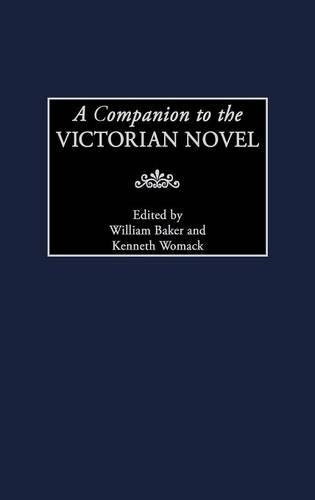
A Companion to the Victorian Novel
(Hardback)
Publishing Details
A Companion to the Victorian Novel
By (Author) William Baker
Edited by Kenneth Womack
Bloomsbury Publishing PLC
Greenwood Press
30th January 2002
United States
Classifications
Tertiary Education
Non Fiction
Literary studies: c 1800 to c 1900
823.809
Physical Properties
Hardback
464
Description
Victorian novels remain enormously popular today. Some continue to be made into films, while authors such as Charles Dickens and George Eliot are firmly established in the canon and taught at all levels. These works have also attracted a great deal of critical attention, with much current scholarship examining the novel in relation to its historical, political, and cultural contexts. This reference work is an introductory guide to the Victorian novel, its background, and its legacy. The first section looks at the emergence of the Victorian novel and its literary precursors, with particular emphasis on the growth of serialization and the development of the novel of syndication. The second explores significant and social and cultural facets of 19th-century British literature, while the third discusses the principal features of different genres, such as ghost stories, the Gothic, detective fiction, the social problem novel, and contemporary film adaptations. Individual authors are examined in the fourth section, while the fifth overviews various critical approaches and their application to 19th-century fiction.
Reviews
A Comparison to the Victorian Novel would be an excellent purchase for undergraduate libraries. In addition to the accessible prose style-nearly all the articles are blissfully free of jargon-the relative brevity of the pieces, most of which run about ten pages, means that each is well within even the most reluctant student's attention limits.-Victorian Periodicals Review
Including sections on literary and cultural contexts, genres (e.g., motion pictures based on specific novels and juvenalia), major authors, and critical approaches, this compendium will be a useful research tool...Baker and Womack's collection is a significant addition to the literature used by upper-division undergraduates through scholars.-Choice
"Including sections on literary and cultural contexts, genres (e.g., motion pictures based on specific novels and juvenalia), major authors, and critical approaches, this compendium will be a useful research tool...Baker and Womack's collection is a significant addition to the literature used by upper-division undergraduates through scholars."-Choice
"A Comparison to the Victorian Novel would be an excellent purchase for undergraduate libraries. In addition to the accessible prose style-nearly all the articles are blissfully free of jargon-the relative brevity of the pieces, most of which run about ten pages, means that each is well within even the most reluctant student's attention limits."-Victorian Periodicals Review
Author Bio
WILLIAM BAKER is Professor, Department of English, and Professor, University Libraries, at Northern Illinois University. He is the Editor of George Eliot-George Henry Lewes Studies, as well as the author or editor of such volumes as Harold Pinter (1973), George Eliot and Judaism (1975), The Libraries of George Eliot and G. H. Lewes (1981), F.R. Leavis and Q.D. Leavis: An Annotated Bibliography (1989), The Early History of the London Library (1992), The Letters of George Henry Lewes (1995, 1999), Literary Theories: A Case Study in Critical Performance (1996), and The Letters of Wilkie Collins (1999). KENNETH WOMACK is Assistant Professor of English at Penn State Altoona. In addition to coauthoring Recent Work in Critical Theory, 1989-1995: An Annotated Bibliography (Greenwood, 1996) and Twentieth-Century Bibliography and Textual Criticism: An Annotated Bibliography (Greenwood, 2000), and coediting the Dictionary of Literary Biography's three-volume British Book Collectors and Bibliographers series (1997-1999), he has published numerous articles on twentieth-century British and American literature and film. He is editor of Interdisciplinary Literary Studies: A Journal of Criticism and Theory, correspondent for the World Shakespeare Bibliography, and associate editor of George Eliot-George Henry Lewes Studies.
